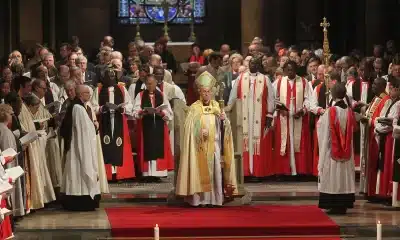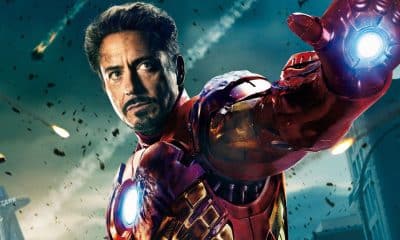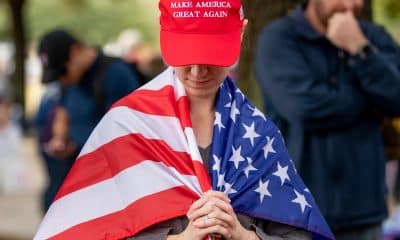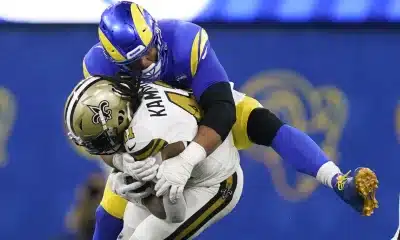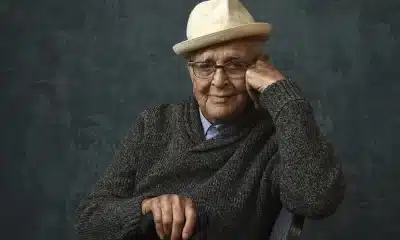Money
Mormon Church Fined For Obscuring $32 Billion Investment Portfolio
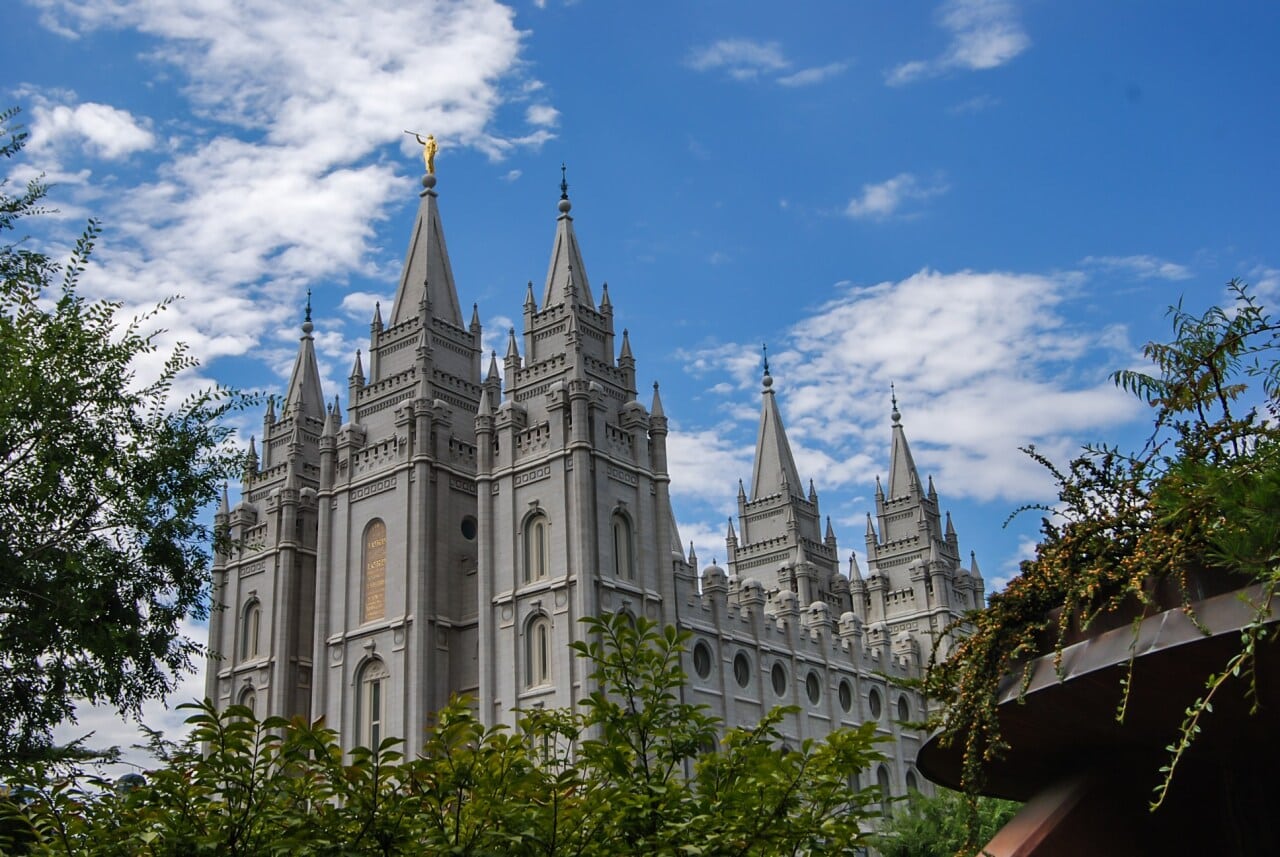
SALT LAKE CITY, Utah — The Securities and Exchange Commission fined the Church of Jesus Christ of Latter-day Saints and its investment arm $5 million on Tuesday for using shell companies to conceal the size of the portfolio under church control.
As commonly known, the Mormon Church has billions of dollars invested in stocks, bonds, real estate, and agriculture. The presiding bishopric, which is made up of religious leaders, is in charge of Ensign Peak Advisers, which is a non-profit investment manager.
The Mormon church has agreed to pay $1 million in penalties, while Ensign Peak will pay $4 million.
According to Gurbir Grewal, the SEC’s enforcement director, Ensign Peak avoided disclosing investments “with the church’s knowledge,” denying the SEC and the accurate public information required by law.
According to federal investigators, the firm violated agency rules and the Securities Exchange Act for 22 years by failing to file paperwork that disclosed the value of its assets.
The Mormon Church Needs to Start Paying Taxes
Instead, they claimed Ensign Peak filed the forms through 13 shell companies they established while retaining decision-making authority. They also had “business managers,” most church employees, sign the required shell company filings.
“The Mormon Church was concerned that disclosing its portfolio, which had grown to approximately $32 billion by 2018,” the SEC said in a statement announcing the charges.
Because religious organizations are exempt from paying US taxes, the church and its Salt Lake City-based investment arm have come under increased scrutiny. Ensign Peak is a church-registered supporting organization and integrated auxiliary. Large investment managers are required to report stock holdings quarterly.
It gained traction in 2019 after a whistleblower claimed the church had amassed nearly $100 billion in funds instead of directing them to charitable causes. Since then, Ensign Peak has been a source of fascination and mystery for the nearly 17-million-member Utah-based faith, encouraging members worldwide to give 10% of their income in practice known as “tithing.”
Two years later, prominent church member James Huntsman filed a lawsuit against the mormon church, alleging that it misrepresented how it used donations and invested them in assets such as real estate and an insurance company rather than directing them to charitable causes. Last year, a judge dismissed the complaint, and Huntsman appealed the decision.
Earlier this month, the 2019 whistleblower, David Nielsen, a former Ensign Peak investment manager, submitted a 90-page memorandum to the United States Senate Finance Committee demanding oversight of the mormon church’s finances.
Church officials said that none of their holdings went unreported.
Mormon Church officials said that none of their holdings went unreported during the investigation period, and all were disclosed through separate companies. They stated that they had “relied on legal counsel regarding how to comply with its reporting obligations while attempting to maintain the portfolio’s privacy” and that Ensign Peak had changed its reporting strategy after learning of the SEC’s concerns in 2019.
“We affirm our commitment to following the law, apologize for any errors, and now consider this matter closed,” they said.
Sam Brunson, a Mormon church member and Loyola University Chicago tax law professor, said the $5 million fine differed from previous accusations against Ensign Peak because the church appears to have admitted some fault.
Failure to file SEC paperwork may not spark broader discussions about how the church manages its money, but it does reflect an “incredibly aggressive” strategy to keep certain information hidden from the public, he said.
“The Mormon Church has had an ethos of keeping its finances private for the last 70 years,” Brunson said.
SOURCE – (AP)
Finance
Google And Apple Remove Binance from App Stores in the Philippines

The Securities and Exchange Commission (SEC) of the Philippines to deactivate Binance from their app stores. A press release on Tuesday stated that the regulator had written to Google and Apple requesting that Binance-controlled applications be removed from the Google Play Store and Apple App Store.
According to Emilio Aquino, chair of the Securities and Exchange Commission, the public’s continued access to Binance’s websites and apps “threatens the security of Filipino investors’ funds.”
According to the agency, Binance operated as an unregistered broker and offered unregistered securities to Filipinos, violating Philippine securities laws. As of the time of this writing, neither nor Google nor Apple could be reached for comment.
According to Aquino, blocking from the Apple and Google app stores would help prevent “further proliferation of its illegal activities in the country and to protect investors from its negative economic effects.”
The National Telecommunications Commission of the Philippines has previously blocked access to website in the country.
Earlier this year, the SEC warned the public against using in the Philippines, and began examining the possibility of blocking Binance’s services there. According to the SEC, Binance has actively promoted its services on social media to attract funds from Filipinos, despite the fact that it is not licensed.
As a result, the watchdog is urging Filipinos who have invested to close their positions as soon as possible, or to transfer their crypto holdings to their own crypto wallets or exchanges registered in the country.
Richard Teng, formerly CEO of UAE regulator Abu Dhabi Global Markets, was appointed as Binance’s CEO following a settlement with the U.S. government that involves a $4.3 billion fine for alleged money laundering violations. In addition to the action,
Binance has been witness to a litany of woes recently.
Former CEO Changpeng Zhao has been charged with violating the Bank Secrecy Act and has agreed to step down. Zhao’s sentencing is scheduled for April 30.
Several lawsuits have been filed against by the Securities and Exchange Commission and the Commodity Futures Trading Commission regarding alleged mismanagement of customer assets and the operation of an illegal, unregistered exchange.
News
Police Arrest Six People Over US$14.5 Million Gold Heist in Canada
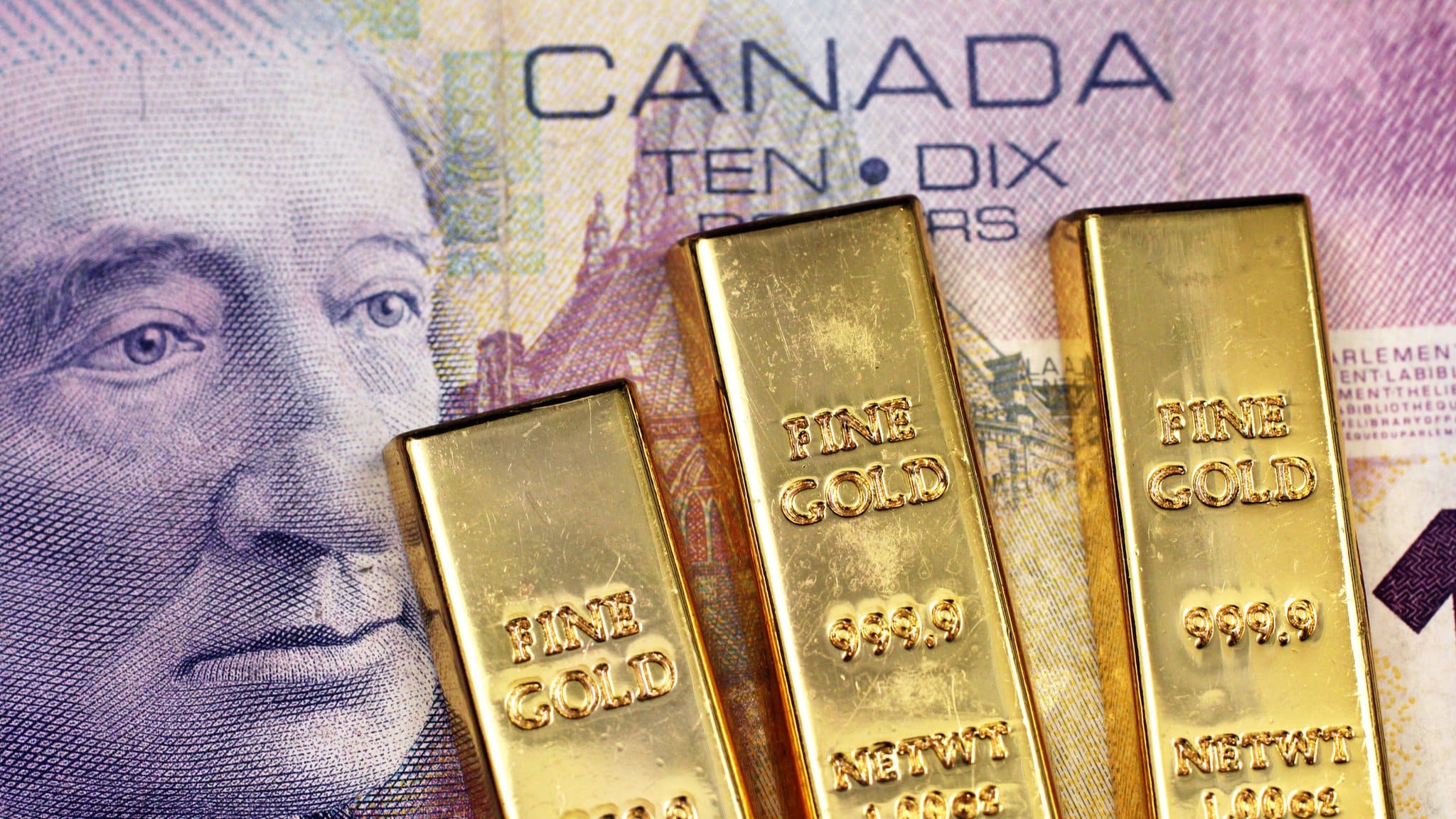
Six people have been arrested, including a jeweler and a commercial airline employee, and police have issued warrants for three more suspects in connection with what they say the single-largest gold robbery in Canadian history.
According to Peel Regional Police in Ontario, a joint investigation with the United States Bureau of Alcohol, Tobacco, Firearms, and Explosives (ATF) resulted in the filing of nearly two dozen charges against the suspects in connection with the nearly $20 million Canadian dollar ($14.5 million) heist that occurred a year ago.
During a news conference in Ontario on Wednesday, Peel Regional Police Detective-Sergeant Mike Mavity told reporters that 400 kilograms of gold bars weighing more than 900 pounds, as well as approximately CA$2.5 million ($1.8 million) in stolen bank notes, were hijacked at Toronto Pearson International Airport after arriving on a commercial flight from Europe.
In total, 6,600 gold bars of various sizes were stolen, each of which was “99.9% pure and contained individualized serial numbers,” according to Mavity.
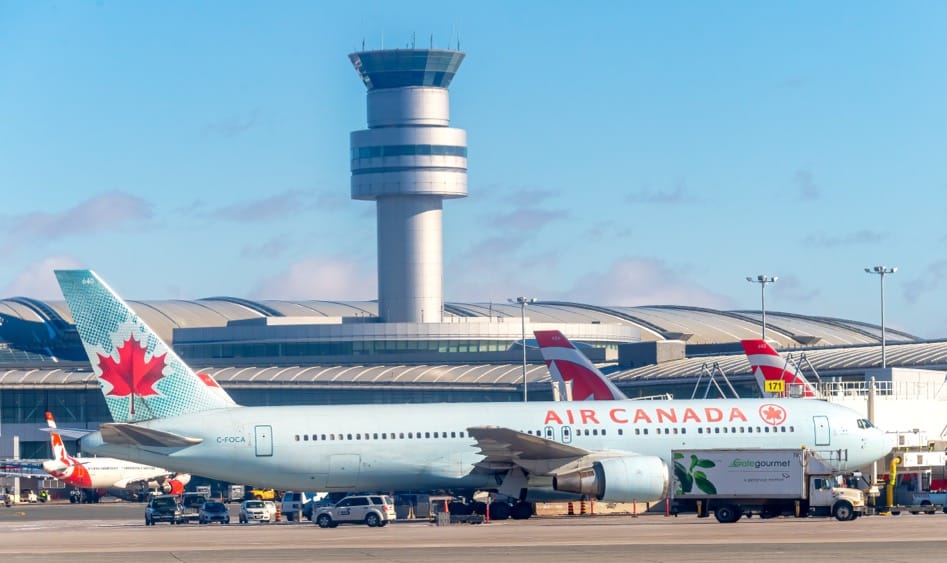
Gold Was in Hull of Air Canada aeroplane: File Photo
According to Peel Regional Police in Ontario, a joint investigation with the United States Bureau of Alcohol, Tobacco, Firearms, and Explosives (ATF) resulted in nearly two dozen charges being filed against the suspects in connection with the nearly $20 million Canadian dollar heist that occurred on April 17, 2023.
On April 17, 2023, the gold and money were loaded into the hull of an Air Canada flight in “an approved airline container” bound for Toronto.
At 3:56 p.m. same day, the flight arrived at Toronto Pearson International Airport, and the gold and cash were quickly removed from the aircraft and transported to an Air Canada facility.
At 6:32 p.m., a man suspect came at air can freight driving a 5-ton truck and approached the property with what police called a counterfeit airway bill, a document used by carriers to track shipments.
Shortly after, a forklift arrived and loaded the item into the suspect’s truck. The suspect then drove off.
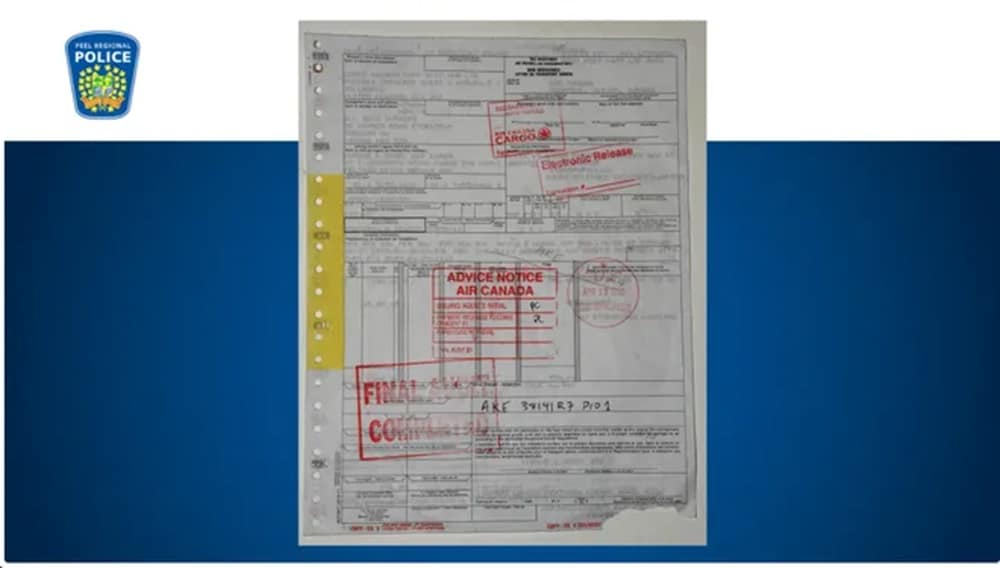
Fake Shipping Bill: Photo Peel Police
According to a police press release, officials discovered the document bill at 2:43 a.m. the next day to be a duplicate of an airline bill for a valid shipment of fish delivered and picked up the day before.
According to Mavity, the fake bill was produced at the Air Canada facility, and when officials discovered the products were gone, they used security footage to monitor part of the suspect’s subsequent trip until losing track of the truck in north Milton, an Ontario suburb.
Police stated that the crime was an inside operation and that a former Air Canada manager was wanted in the case.
So far police said they have arrested the following suspects in connection to the gold heist case:
- Air Canada employee Parmpal Sidhu, 54, of Ontario
- Jewelry store owner Ali Raza, 37, of Toronto
- Amit Jalota, 40, of Ontario
- Ammad Chaudhary, 43, of Ontario
- Prasath Paramalingam, 35, of Ontario
All five were released on bail and are scheduled to appear in court at a later date, Mavity said.
The truck driver who allegedly picked up the gold, Durante King-Mclean, 25 of Ontario, is currently in custody in the U.S. on firearms and trafficking related charges.
Here are the suspects at large:
- Air Canada manager Simran Preet Panesar, 31, of Ontario
- Archit Grover, 36, of Ontario
- Arsalan Chaudhary, 42, of Ontario
Only CA$90,000 ($65,000) of the more than CA$20 million recovered, said to Peel Regional Deputy Chief Nick Milinovich.
According to US Today, U.S. ATF Special Agent Eric DeGree, King-Mclean was detained in Pennsylvania following a traffic stop that resulted in the seizure of 65 illicit guns destined for Canada. According to DeGree, King-Mclean attempted to flee after police discovered the firearms in a rental car he was driving.
According to Air Canada spokesman Peter Fitzpatrick, two of the individuals identified by police worked for the airline’s cargo division at the time of the crime.
“One left the company prior to the arrests announced today, and the second has been suspended,” he stated, according to the site. “Because matter is now before the courts, we are unable to speak further.
According to the announcement, only about CA $90,000 (one kilogram of gold) has been found and melted down into bangle bracelets. According to authorities, the remaining gold was most likely melted down and used to purchase illicit weaponry.
“I commend our investigators, the ATF, other law enforcement partners, and our community for working together to identify and arrest those responsible for this brazen crime,” Peel Regional Police Chief Nishan Duraiappah said in a statement this week.
Anyone with information regarding the case should contact Peel Regional Police.
Finance
Why Gold Prices Are At Record Highs
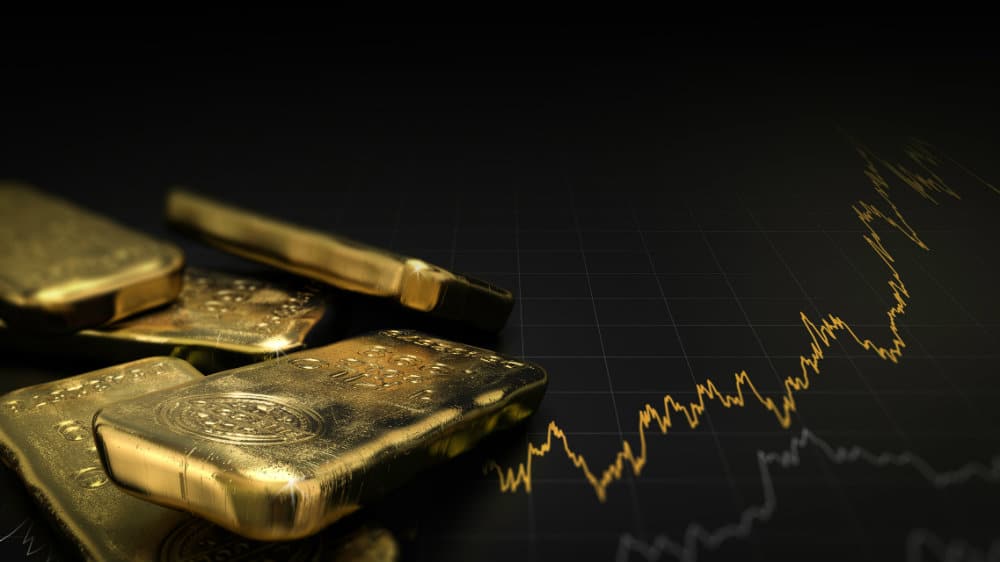
From central banks to Costco shoppers, everyone is purchasing gold these days. Spot gold touched $2,364 per ounce on Tuesday, following seven consecutive sessions of record highs and trading at $2,336 per ounce on Monday. Year on year, gold is up 16.5%.
Investors who expect the Federal Reserve to lower its benchmark interest rate are the primary drivers of price increases, but other factors, such as central banks buying gold, headed by China, to reduce reliance on US currency, are also contributing.
Why Gold Prices Are At Record Highs
Central banks view gold as a long-term store of value and a haven during periods of economic and international crisis.
Gold is regarded as a reliable investment. When interest rates fall, gold prices often climb, as bullion becomes more tempting than income-paying assets such as bonds. Investors also view gold as a hedge against inflation, anticipating that it would preserve its value as prices rise.
According to Reuters, the People’s Bank of China purchased gold for the 17th consecutive month in March, adding 160,000 ounces to its stockpile of 72.74 million troy ounces.
According to a UBS research note dated April 9, central banks may wish to “diversify away” from the US currency and acquire it in the face of geopolitical instability. Demand drives up prices as China expands its reserves, which traditional investors have already increased.
According to a Capital Economics research report published on April 9, Chinese investors are looking to gold as an alternative asset due to recent downturns in property valuations and equity prices.
Other central banks, including India and Turkey, are expanding their reserves. According to UBS, India’s GDP growth is fueling these acquisitions.
A sign of the times?
According to Ulf Lindahl, CEO of Currency Research Associates, central banks’ appetite for gold indicates a declining reliance on the dollar.
Lindahl said in an email that dollars are becoming increasingly undesirable to central banks seeking to reduce their economic dependency on the United States.
According to a March JP Morgan research note, nations not allies of the United States may accumulate gold to “mix away from dollars” and lessen vulnerability to sanctions.
According to the note, central bank purchases have fuelled the rise in gold prices since 2022. According to JP Morgan, gold may be entering a strong era, as central bank purchases of gold in 2022 were more than double the average annual buy over the previous decade.
The price increase coincides with US Treasury Secretary Janet Yellen’s visit to China to address financial stability in US-China relations and what Yellen refers to as Chinese electric vehicle overproduction.
Mark Zandi, chief economist at Moody’s, believes that rising oil costs threaten the US economy.
According to the UBS research report, higher oil costs are anticipated to raise inflationary fears, causing gold prices to rise.
The typical view of gold
The spike in gold prices indicates that investors expect the Fed to drop interest rates later this year, but they may be concerned about the prospects of containing inflation without causing the US economy to enter a recession, sometimes known as a soft landing.
According to an April 9 research note from UBS, the prospect of Fed rate cuts remains the primary driver of optimistic sentiment toward gold.
Fed Chair Jerome Powell said in remarks on April 3 that inflation remains on a “sometimes bumpy path” toward the Fed’s 2% target and that rate cuts to rebalance the economy are expected to begin later this year.
According to CME Group data, 51% of investors currently predict a quarter-point decrease in June. However, employment growth in March exceeded projections, casting doubt on the need for numerous rate reductions in an economy that remains strong.
The Personal Consumption Expenditures price index, the Fed’s favored inflation gauge, increased 2.5% in the year ended in February. According to Department of Commerce figures issued this month, this represents a little uptick from the 2.4% increase in January.
The core PCE price index, which excludes the more volatile food and energy sectors, increased 0.3% monthly. Fed officials consider the index a key indicator of underlying inflation, and it fell from 0.4% in January when it increased at the strongest rate in a year.
So, why is gold soaring right now?
Some investors are buying into the frenzy around gold bullion as prices increase, pushing them further. On Reddit, proud buyers frequently create threads touting their collections.
Costco started selling bars online in August and silver coins in January. Wells Fargo estimates that the corporation currently sells up to $200 million in gold and silver per month. Chief Financial Officer Richard Galanti told analysts in December that the company had sold over $100 million in gold bars in the previous quarter.
The investment note, released on April 9, stated, “The accelerating frequency of Reddit posts, quick online sell-outs of product, and [the company’s] robust monthly eComm sales suggests a sharp uptick in momentum since the launch.”
Lindahl stated that “trend followers” and others capitalize on price increases as the long-term trend indicates much higher costs.
It’s also worth mentioning that gold has historically been a haven during political turmoil. Voters in almost 60 countries, including the US presidential election, will go to the polls this year. The increase in geopolitical and economic volatility highlights the value of precious metals.
SOURCE – (CNN)
-
Entertainment5 months ago
Robert Downey Jr. Won’t Be Returning To The Marvel Cinematic Universe As Tony Stark
-
Politics5 months ago
Unveiling the Power and Influence of The Conservative Treehouse
-
Sports4 months ago
Saints’ Aggressive Play-Calling Ends Up Coming Back To Hurt Them In Loss To Rams
-
Business5 months ago
Tesla’s Cybertruck Hits The Market With A Higher Price Tag And Plenty Of Challenges
-
Innovation5 months ago
Sony Debuts First PS5 Controller For Disabled Gamers
-
Celebrity5 months ago
Norman Lear, Producer Of TV’s ‘All In The Family’ And Influential Liberal Advocate, Has Died At 101






